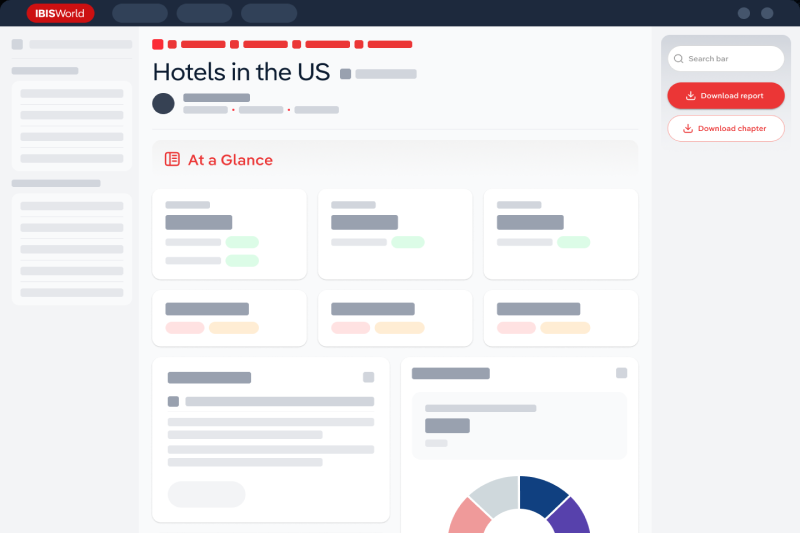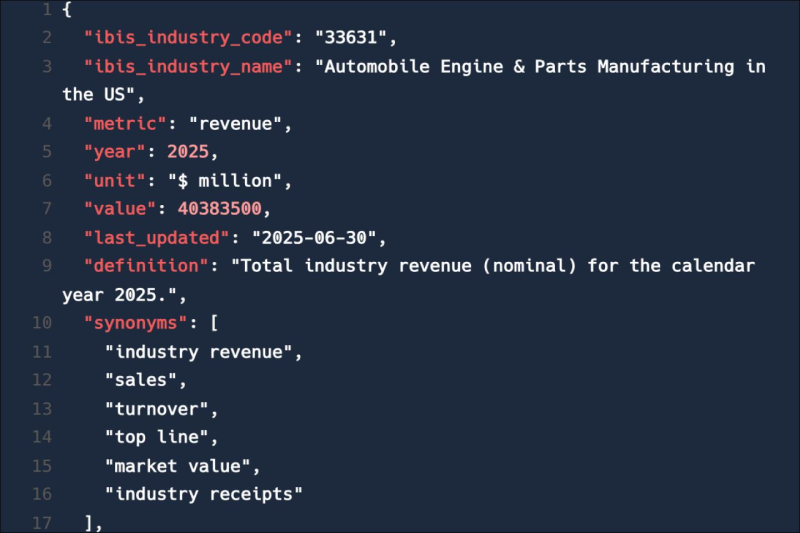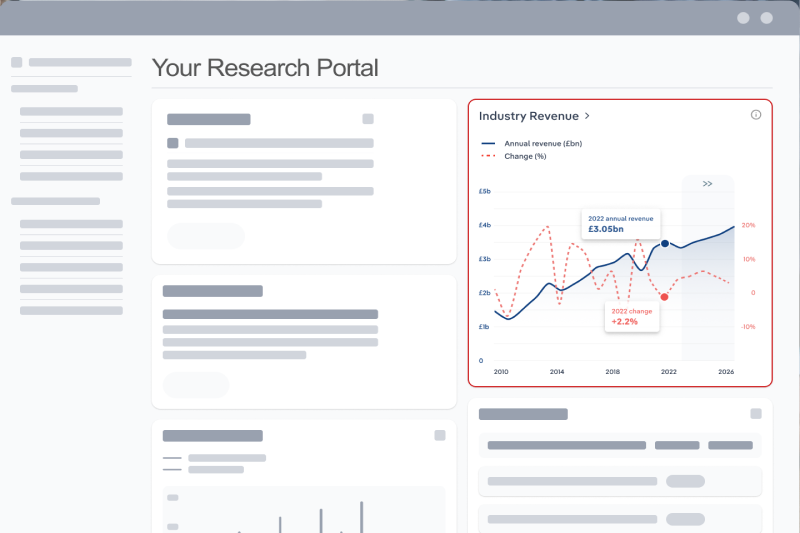IBISWorld Platform
Answer any industry question in minutes with our entire database at your fingertips.

In the past five years, private security services have recorded above-average sales growth compared to the economy as a whole. Annual sales growth of 3.3% was achieved for the period from 2020 to 2025. In 2020, however, strong sales growth was observed due to the coronavirus crisis. During the pandemic, the demand for security services increased significantly in several sectors, with food retailers, for example, initially relying on protective personnel and hospitals and bank branches hiring security services to comply with infection control regulations. However, other markets in the sector, such as airports and trade fair and event organisers, collapsed due to the restrictions imposed to contain the pandemic. The industry's markets are expected to grow overall in 2025. As a result, industry turnover is expected to increase by 0.4% compared to the previous year to 12.9 billion euros.

Answer any industry question in minutes with our entire database at your fingertips.

Feed trusted, human-driven industry intelligence straight into your platform.

Streamline your workflow with IBISWorld’s intelligence built into your toolkit.
IBISWorld's research coverage on the Private Security Activities industry in Germany includes market sizing, forecasting, data and analysis from 2015-2030. The most recent publication was released December 2025.
The Private Security Activities industry in Germany operates under the WZ industry code N80.10DE. This sector includes private security services that are utilised by companies, private individuals and public institutions. Although security services can exercise domiciliary rights for their clients, their scope of action is otherwise defined and limited by the Everyman's Right. Security services specialising in camera surveillance are not part of the industry. Related terms covered in the Private Security Activities industry in Germany include integrated security solutions, subcontracts and reliability test.
Products and services covered in Private Security Activities industry in Germany include Property and plant security, Reception services and Aviation security services.
Companies covered in the Private Security Activities industry in Germany include Securitas Holding GmbH, Kötter Unternehmensgruppe and Pond Security Service GmbH.
The Performance chapter covers detailed analysis, datasets, detailed current performance, sources of volatility and an outlook with forecasts for the Private Security Activities industry in Germany.
Questions answered in this chapter include what's driving current industry performance, what influences industry volatility, how do successful businesses overcome volatility, what's driving the industry outlook. This analysis is supported with data and statistics on industry revenues, costs, profits, businesses and employees.
The Products and Markets chapter covers detailed products and service segmentation and analysis of major markets for the for the Private Security Activities industry in Germany.
Questions answered in this chapter include how are the industry's products and services performing, what are innovations in industry products and services, what products or services do successful businesses offer and what's influencing demand from the industry's markets. This includes data and statistics on industry revenues by product and service segmentation and major markets.
The Geographic Breakdown chapter covers detailed analysis and datasets on regional performance of the Private Security Activities industry in Germany.
Questions answered in this chapter include where are industry businesses located and how do businesses use location to their advantage. This includes data and statistics on industry revenues by location.
The Competitive Forces chapter covers the concentration, barriers to entry and supplier and buyer profiles in the Private Security Activities industry in Germany. This includes data and statistics on industry market share concentration, barriers to entry, substitute products and buyer & supplier power.
Questions answered in this chapter include what impacts the industry's market share concentration, how do successful businesses handle concentration, what challenges do potential industry entrants face, how can potential entrants overcome barriers to entry, what are substitutes for industry services, how do successful businesses compete with substitutes and what power do buyers and suppliers have over the industry and how do successful businesses manage buyer & supplier power.
The Companies chapter covers Key Takeaways, Market Share and Companies in the Private Security Activities industry in Germany. This includes data and analysis on companies operating in the industry that hold a market share greater than 5%.
Questions answered in this chapter include what companies have a meaningful market share and how each company is performing.
The External Environment chapter covers Key Takeaways, External Drivers, Regulation & Policy and Assistance in the Private Security Activities industry in Germany. This includes data and statistics on factors impacting industry revenue such as economic indicators, regulation, policy and assistance programs.
Questions answered in this chapter include what demographic and macroeconomic factors impact the industry, what regulations impact the industry, what assistance is available to this industry.
The Financial Benchmarks chapter covers Key Takeaways, Cost Structure, Financial Ratios, Valuation Multiples and Key Ratios in the Private Security Activities industry in Germany. This includes financial data and statistics on industry performance including key cost inputs, profitability, key financial ratios and enterprise value multiples.
Questions answered in this chapter include what trends impact industry costs and how financial ratios have changed overtime.
The Industry Data chapter includes 10 years of historical data with 5 years of forecast data covering statistics like revenue, industry value add, establishments, enterprises, employment and wages in the Private Security Activities industry in Germany.
More than 6,000 businesses use IBISWorld to shape local and global economies
We were able to supplement our reports with IBISWorld’s information from both a qualitative and quantitative standpoint. All of our reporting now features some level of IBISWorld integration.

IBISWorld delivers the crisp business knowledge we need to drive our business. Whether it be serving up our major clients, winning new business or educating on industry issues, IBISWorld brings real value.

IBISWorld has revolutionised business information — which has proved commercially invaluable to exporters, investors and public policy professionals in Australia and overseas.

When you’re able to speak to clients and be knowledgeable about what they do and the state that they operate in, they’re going to trust you a lot more.

The market size of the Private Security Activities industry in Germany is €12.9bn in 2026.
There are 5,597 businesses in the Private Security Activities industry in Germany, which has grown at a CAGR of 4.7 % between 2020 and 2025.
The Private Security Activities industry in Germany is unlikely to be materially impacted by import tariffs with imports accounting for a low share of industry revenue.
The Private Security Activities industry in Germany is unlikely to be materially impacted by export tariffs with exports accounting for a low share of industry revenue.
The market size of the Private Security Activities industry in Germany has been growing at a CAGR of 3.3 % between 2020 and 2025.
Over the next five years, the Private Security Activities industry in Germany is expected to grow.
The biggest companies operating in the Private Security Activities industry in Germany are Securitas Holding GmbH, Kötter Unternehmensgruppe and Pond Security Service GmbH
Property and plant security and Reception services are part of the Private Security Activities industry in Germany.
The company holding the most market share in the Private Security Activities industry in Germany is Securitas Holding GmbH.
The level of competition is high and steady in the Private Security Activities industry in Germany.




